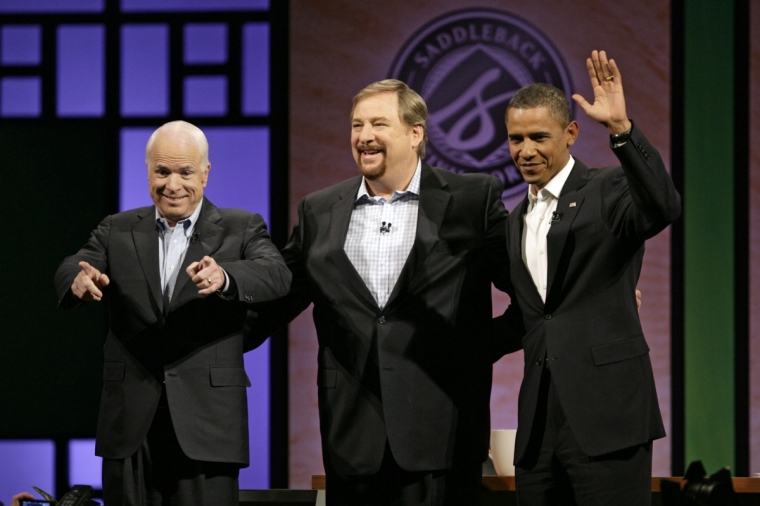EXCLUSIVE: Even after joining Rubio's advisory group, Rick Warren won't endorse a candidate

LAKE FOREST, Calif. (Christian Examiner)—Despite the recent announcement that Rick Warren has joined an advisory board for Republican presidential candidate Marco Rubio, the Southern California megachurch pastor and best-selling author of The Purpose Driven Life says he'll never endorse a political candidate—and he's not endorsing Rubio.
The Christian Examiner reported on Thursday that Warren had joined a number of prominent evangelicals on a religious liberty advisory board for Rubio, but his action should not be taken as an endorsement, he says.
In this election cycle, I know most of the candidates on both sides who are running for president, and many have been friends for years, but they all know that I never endorse.
"It is public knowledge that I never have endorsed a political candidate and never intend to," said Rick Warren, pastor of Saddleback Church, in an exclusive comment to the Christian Examiner. "It is not my job as a pastor to endorse candidates. But I do offer private counsel and perspective to any candidate who asks for it. I have done this with many candidates in the past. In this election cycle, I know most of the candidates on both sides who are running for president, and many have been friends for years, but they all know that I never endorse."
Though Warren has counseled, advised and developed relationships with political figures across the political spectrum—and spoken out on a number of specific political issues, he has avoided taking sides in elections. He famously talks about being neither "left-wing or right-wing" but instead being for the "whole bird."
In 2008 both Democratic and Republican presidential candidates participated in a nationally televised public forum at Saddleback Church where Warren asked both of them questions about their spiritual backgrounds, abortion, the definition of marriage, education and a myriad of other issues. The following January Obama made Warren his controversial choice to pray at his first inauguration. Warren later became critical of the president's record on religious freedom, particularly as it related to Obama's controversial Affordable Care Act.
During the 2012 election cycle, Warren planned on holding a similar public forum at Saddleback for the presidential candidates. He canceled the forum in August because of what he called a growing uncivility in the campaign.
"We created the civil forums to promote civility and personal respect between people with major differences," Warren told the Orange County Register. "The forums are meant to be a place where people of goodwill can seriously disagree on significant issues without being disagreeable or resorting to personal attack and name-calling. But that is not the climate of today's campaign. I've never seen more irresponsible personal attacks, mean-spirited slander, and flat-out dishonest attack ads, and I don't expect that tone to change before the election. It would be hypocritical to pretend civility for one evening only to have the name-calling return the next day."
He also wanted to focus his attention on a subsequent forum specifically on the issue of religious liberty.
Warren interviewed former Republican president George W. Bush during a 2013 public forum on leadership at Saddleback.
Warren has played a vocal role in a few political issues in recent years, most notably coming out in favor of California's Proposition 8 in 2008, which overturned a court decision earlier in the year that had legalized gay marriage. The proposition passed in November of that year. The state officially repealed the law in July of 2014.
Before Warren's call into Christian ministry, he considered a career in politics according to Jeffery Sheler's 2009 biography "Prophet of Purpose." Sheller documents a protest he led while in high school after voters turned down a local bond that would have provided funds for a new high school building in his northern California community. Warren's leadership during the effort drew attention to some of his leadership skills and piqued his interest in a future political career. Sheler says he even began to fantasize about a future run for president.
Eventually he began to realize that his desire to impact the world around him would be better served in ministry than politics.
"I realized that you can't legislate a change of heart. You can't change society through laws if people want to break them," Warren said according to Sheler's book. "To really make a difference in the world you need to change people's hearts, and only Christ can do that. So that is what I began to care about."